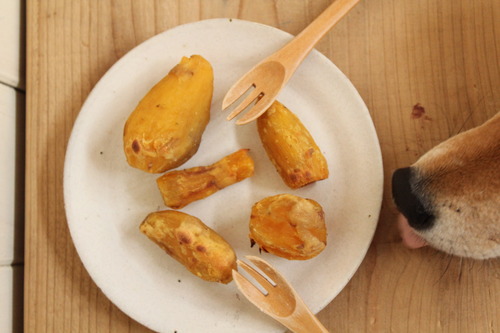Sweet potatoes are a popular and nutritious food for humans, but have you ever wondered if they are safe for your canine companion? Pet owners might ask, “Can dogs eat sweet potatoes?” It’s an important question, and as a responsible dog parent, you want to ensure your furry friend’s diet is healthy and balanced. In this blog, we’ll explore whether dogs can safely enjoy sweet potatoes, their nutritional benefits, potential risks, and the best ways to prepare them for your pet. If you have any concerns or questions about your dog’s diet, call Harlingen Veterinary Clinic in Belle Mead, New Jersey, at (908) 359-2000 or book an appointment online today!
What Makes Sweet Potatoes a Healthy Treat for Dogs?
Sweet potatoes are packed with essential nutrients that can benefit your dog’s overall health. Rich in vitamins, minerals, and fiber, they offer a range of advantages when given in moderation. Let’s break down the key components that make sweet potatoes a healthy treat for dogs.
High in Dietary Fiber
Fiber is crucial for maintaining a healthy digestive system, and sweet potatoes are an excellent source. A moderate amount of dietary fiber can help regulate bowel movements and promote gut health in dogs. However, excessive fiber can lead to gastrointestinal issues, so it’s important to serve sweet potatoes in appropriate portions.
Loaded with Vitamins and Minerals
Sweet potatoes are abundant in essential vitamins like vitamin A, B6, and C, as well as minerals such as potassium and manganese. Vitamin A supports eye health and a strong immune system, while B6 aids in brain function and energy metabolism. The antioxidants in vitamin C help combat free radicals, contributing to your dog’s overall well-being.
Low in Fat and Calories
For pet owners concerned about their dog’s weight, sweet potatoes offer a low-fat, low-calorie alternative to other treats. They can satisfy your dog’s craving for something tasty without contributing to unhealthy weight gain. While sweet potatoes offer numerous benefits, it’s important to understand potential risks as well before adding them to your dog’s diet.
Potential Risks of Feeding Sweet Potatoes to Dogs
While sweet potatoes are generally safe for dogs, there are some risks you should consider. Feeding sweet potatoes improperly or in excess can lead to health problems. Here are a few concerns to keep in mind.
Risk of Digestive Upset
Introducing sweet potatoes into your dog’s diet too quickly or in large quantities can cause digestive upset. Symptoms such as diarrhea, vomiting, or bloating may occur. To avoid these issues, start with small portions and observe how your dog reacts.
Choking Hazard
Raw sweet potatoes are firm and can pose a choking risk, especially for smaller dogs. Always ensure that sweet potatoes are cooked and cut into bite-sized pieces before serving them to your pet.
High Glycemic Index
Sweet potatoes have a high glycemic index, meaning they can cause a spike in blood sugar levels. For dogs with diabetes or those prone to weight gain, consult your veterinarian before incorporating sweet potatoes into their diet.
How to Safely Prepare Sweet Potatoes for Dogs
The way you prepare sweet potatoes can significantly impact their safety and nutritional value for your dog. Follow these tips to ensure your furry friend can enjoy sweet potatoes without any issues.
- Cooked, Not Raw: Always cook sweet potatoes before offering them to your dog. Cooking softens the texture, making them easier to chew and digest. Baking, boiling, or steaming are the best cooking methods, as they preserve the nutrients without adding harmful ingredients.
- Avoid Seasonings and Additives: Dogs don’t need salt, butter, sugar, or spices on their sweet potatoes. These additives can be harmful to your pet’s health, so it’s best to serve plain, unseasoned sweet potatoes.
- Portion Control: Moderation is key when feeding your dog sweet potatoes. Too much can lead to digestive issues or weight gain. As a general rule, sweet potatoes should make up no more than 10% of your dog’s daily caloric intake.
- Mash or Cut into Small Pieces: To minimize choking risks, mash the sweet potatoes or cut them into small, manageable pieces. This is especially important for puppies or smaller breeds.
If you have concerns about whether sweet potatoes are a good fit for your dog’s diet, call Harlingen Veterinary Clinic at (908) 359-2000 or book an appointment online today.
Can Sweet Potatoes Be a Part of Your Dog’s Regular Diet?
Many pet owners wonder if sweet potatoes can become a staple in their dog’s diet. While they can be a nutritious addition, they should not replace a balanced dog food diet. Here’s how to incorporate sweet potatoes effectively.
Use as an Occasional Treat
Sweet potatoes are best used as an occasional treat rather than a regular meal component. Their high carbohydrate content means they should complement, not replace, your dog’s primary source of nutrition.
Monitor for Allergies or Sensitivities
Some dogs may have allergies or sensitivities to sweet potatoes. If you notice symptoms like itching, redness, or gastrointestinal upset after feeding your dog sweet potatoes, discontinue use and consult your veterinarian.
Pair with a Balanced Diet
Sweet potatoes should always be paired with a high-quality commercial dog food that meets your pet’s nutritional needs. This ensures your dog receives the appropriate balance of protein, fats, and other essential nutrients.
Other Vegetables Safe for Dogs
If your dog enjoys sweet potatoes, you might be curious about other vegetables that are safe for them to eat. Adding variety to your dog’s diet can be beneficial, as long as the vegetables are prepared safely.
- Carrots: Carrots are another low-calorie, nutrient-rich option for dogs. They’re high in fiber and beta-carotene, making them a great snack for promoting eye health.
- Green Beans: Green beans are an excellent source of vitamins and minerals. They’re low in calories and can be served cooked or raw, as long as they are plain and free of additives.
- Pumpkin: Pumpkin is a great source of fiber and can help with digestive issues. Be sure to use plain, cooked pumpkin and avoid canned pumpkin with added sugar or spices.
If you’re unsure about introducing new vegetables to your dog’s diet, consult your veterinarian for personalized advice.
Sweet Potatoes and Your Dog’s Health
When prepared and served correctly, sweet potatoes can be a healthy and delicious addition to your dog’s diet. They offer a variety of vitamins and minerals that support your dog’s overall health, from a strong immune system to improved digestion. However, moderation is key, and it’s important to monitor your dog for any adverse reactions. For more guidance on your dog’s dietary needs, call Harlingen Veterinary Clinic in Belle Mead, New Jersey, at (908) 359-2000 or book an appointment online today!





